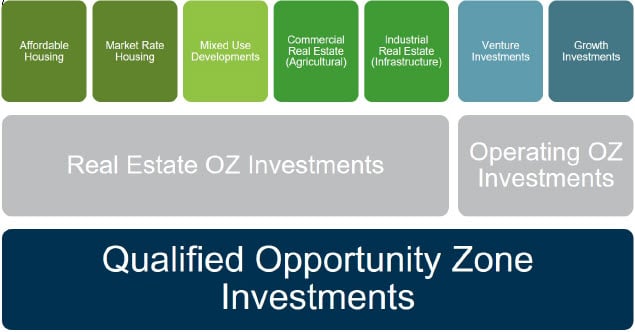The 2017 Tax Cuts and Jobs Act provides tax incentives for investments in “Opportunity Zones,” in an effort to promote economic development in selected communities. Investors can reduce by up to 15 percent taxes on existing capital gains invested via designated “Qualified Opportunity Funds,” deferring those taxes for up to 10 years and eliminating 100 percent of the future capital gains tax on profits generated by the Qualified Opportunity Funds.
Investors, investment managers, municipalities, real estate developers and business owners can benefit from this program – but should first work to understand the types of projects and investments that are best suited for Opportunity Zone funding.
Key Concepts to Understanding the Opportunity Zones Program
For Investors
Opportunity Zone investments exists within an asset class spectrum. The vast majority of investments are likely to be made within the real estate sector, with a smaller but important portion of investments to be made in operating businesses. Understanding how to maximize your return while diversifying your risk profile will be important.

For Investment Managers
Most Opportunity Zone communities have a limited number of "investment ready" projects. Funds will need to be strategic in identifying a pipeline of investment ready projects and selective about developing "but for funding" and concept projects.
When assessing whether or not a project is eligible for Opportunity Zone funding, it’s helpful to consider which of the following three categories it would fall under:
- Conceptual projects: Projects that have not completed their pre-development phase and do not have funding. Opportunity Zone funding alone is not enough to move these projects forward. The community will need to make some investment to move these conceptual projects to the investment ready stage.
- “But for Funding” projects: Projects that have already completed their pre-development phase but have funding gaps. The Opportunity Zone funding typically completes the funding source needed to execute a project. This typically represents a smaller, identifiable fraction of projects in most communities.
- Investment Ready projects: Projects that have already completed their pre-development phase and are essentially funded. The Opportunity Zone funding typically supplants or complements an existing funding source. This represents the smallest but most readily identifiable fraction of projects in most communities.
For Municipalities
Cities will need to market investment ready projects at a minimum but will also need to select and invest in concepts that will develop into investment ready projects. Identifying partners to help in this process as well as partners to ultimately invest will be critical.
Download our guide to the Opportunity Zones program and funding eligibility.
.svg?rev=a492cc1069df46bdab38f8cb66573f1c&hash=2617C9FE8A7B0BD1C43269B5D5ED9AE2)

